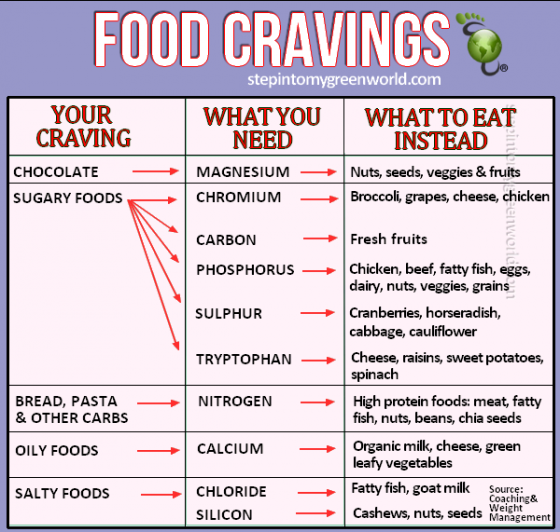
Aside from pregnant women, it’s actually pretty common for most people to crave certain foods. These days the foods are all too often actually really unhealthy for the person, but underlying this craving is a deficiency of some sort. This article takes a look at the most common food cravings and what our bodies really need when we reach for the sugary snacks.
We’ve all been there. Shopping for groceries when hungry is never a good idea, as we will probably end up buying more of the foods which give us an instant up, dropping to a pretty sharp dip. This way, our cravings don’t get truly satisfied and the process begins again.
Science reveals that cravings are a signal from the body that it needs specific minerals that can be present in the unhealthy foods, but are best acquired from consuming whole foods. When our bodies have the right levels of foods we will not find this dramatic craving, and can curb snacking on unhealthy foods.
Contents
Sugary foods
Deficiency in chromium, carbon, phosphorus, sulfur and/or tryptophan
How many people can appreciate this craving? I mean, I think it’s happened to all of us that no matter what we eat, we just crave high-sugar foods. It’s actually a bit of a tough nut for science to crack because there can be so many different nutrients that affect this craving. Deficiencies in chromium upset the balance within the blood sugar levels, meaning this can be a perpetrator of the sugar crave. Additionally, carbon elements actually contribute to the chemical makeup of sugar, which can means that the craving is due to an inefficient level of carbon. Similarly phosphorus helps the body produce energy, so when levels are low, the body naturally wants to make more of it, and craves foods which can ‘cheat’ at doing such. Sulfur is a detoxifier, which can lead to craving sugary foods, again to sort of fool the body into thinking it has what it needs. Finally tryptophan – a serotonin regulator – is an important nutrient found in sweet stuff. So we crave sweet things to kind of replace the miserable feeling of serotonin depletion.
Overall, then the best way to end continuous sugar cravings is to eat a healthier and more varied diet; replenishing supplies of all of the above vitamins and nutrients your body needs to regain optimal health.
Chocolate
Magnesium deficiency
Chocolate is almost always cited as the number one craved food in the Western world. And we know why: it tastes great, releases feel good nutrients and offers a quick high. However, the root cause of our chocolate cravings go much deeper and indeed link to a nutrient deficiency of magnesium. Up to 80 percent of us need to increase magnesium levels, hence we crave chocolate. Integral to over 300 biochemical reactions in the body, magnesium is a mood regulator linked with anxiety, irritability, insomnia and high blood pressure are its main deficiency symptoms. Cacao is fairly rich in magnesium, so the better quality the chocolate, actually the better effect it will have on regulating and stabilizing moodiness. Other sources of magnesium include leafy greens – the darker the better, fish, beans, nut s and seeds. Also blackstrap molasses contains effective levels of magnesium, making it a healthier source to combat cravings.
Refined carbohydrates
Deficiency in nitrogen
Many people seek refined carbs such as bread potatoes and pasta. This could be due to a deficiency in nitrogen. Essential to nucleic acid and protein, nitrogen compounds omitted from the diet can result in malnutrition. This is because they often co-relate to protein deficiency. As such, when you find yourself craving these types of foods, try increasing your nitrogen intake by consuming more fruits and vegetables.
Greasy foods
Calcium deficiency
Improve overall strength and bone density by including more milk, cheese, turnip greens and broccoli.
Advice administered through this article is intended as guidelines only. Any serious malnourishment should be checked out by a physician.

